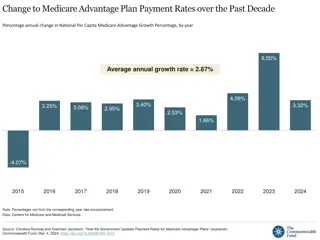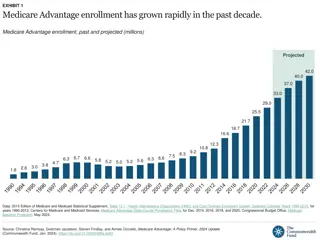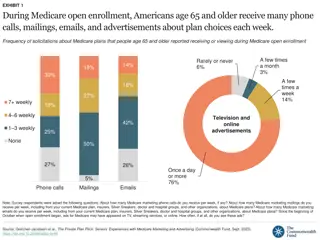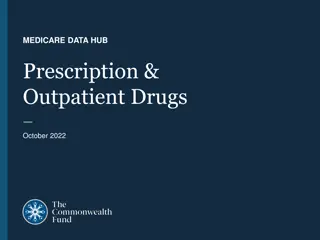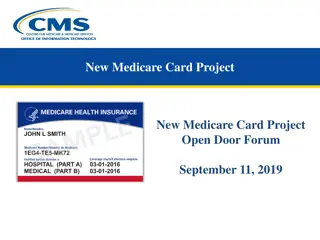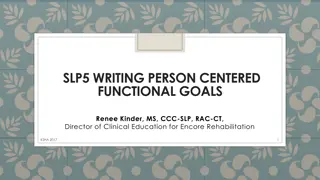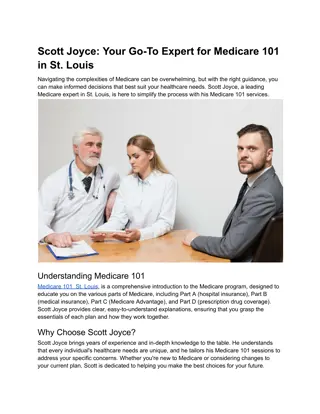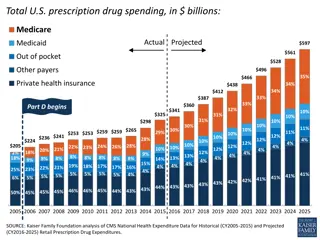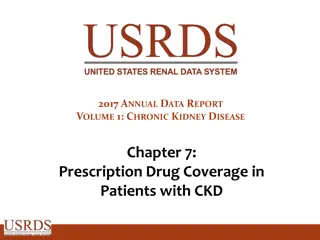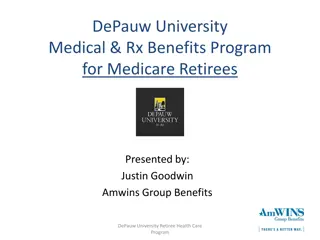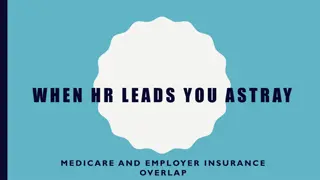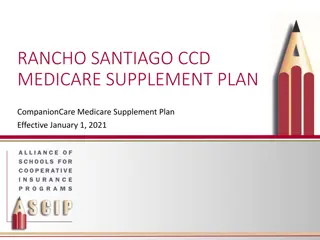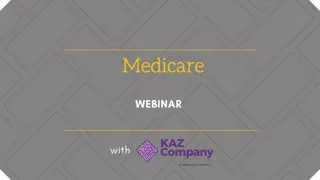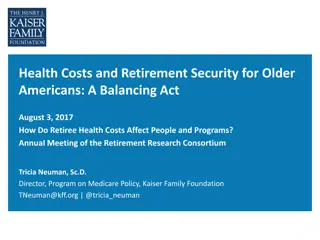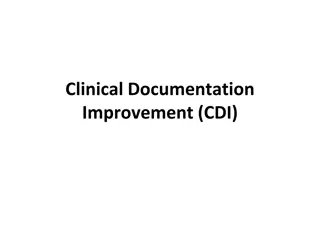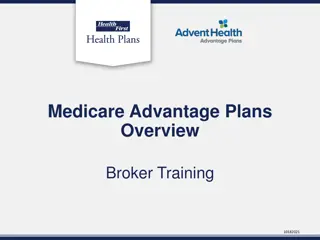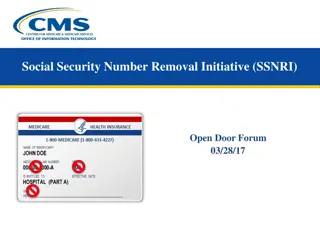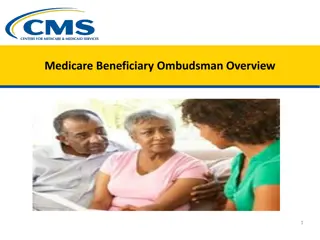Understanding Medicare Marketing Guidelines and Regulations
Explore the essentials of Medicare marketing guidelines, including HIPAA privacy regulations, sales events requirements, Permission to Contact (PTC) procedures, and compliance standards. Learn about agents' responsibilities in safeguarding client information and conducting sales activities. Stay informed on the latest updates and best practices to ensure HIPAA compliance and protect client privacy in the evolving landscape of healthcare marketing.
Download Presentation

Please find below an Image/Link to download the presentation.
The content on the website is provided AS IS for your information and personal use only. It may not be sold, licensed, or shared on other websites without obtaining consent from the author. Download presentation by click this link. If you encounter any issues during the download, it is possible that the publisher has removed the file from their server.
E N D
Presentation Transcript
Unit 2 Medicare Marketing Guidelines
Marketing Requirements and Other Regulations HIPAA Privacy HIPAA stands for: Health Insurance Portability and Accountability Act Agents have responsibilities for ensuring the privacy of clients Protected Health Information (PHI) including, but not limited to: Health Information Claims Information Social Security Numbers Banking Information This information can only be used for the purpose in which it is collected. https://agentsurvivalguide.com/what-are-agents-responsible-for-under-hipaa
Marketing Requirements and Other Regulations Health and Human Services as well as other government entities along with plan sponsors are allowed to modify existing and establish new guidelines for how agents must handle PHI and can audit agents and agencies. As technology evolves the policies put into place are becoming more and more complex such as a new technology law passed in New York. Here are some guidelines for HIPAA compliance and protecting client information. https://agentsurvivalguide.com/what-are-agents-responsible-for-under-hipaa
Sales Events Anytime an agent conducts sales or marketing activities with a prospect or client regarding Medicare Advantage or Part D it is considered a Sales Event There are two types: Formal Informal These events must be filed with CMS through a Plan Sponsor at least 7 days prior to the event or 7 days prior to when it will be advertised. Any changes to the event must be updated with the plan sponsor. Whether on the phone or in person, there are many rules that must be followed.
Permission to Contact (PTC) Another pre-sale activity that often causes confusion for agents is Permission to Contact. Permission to contact can be particularly confusing for tele sales agents who often confuse it with the Scope of Appointment (SOA), seeing both items as synonymous with one another which is not the case. Permission to contact should always be collected and documented prior to obtaining a SOA. Even if a client is an unsolicited walk in or call in, the agent should document it to protect himself/herself in case of an audit or complaint.
Check Point Question INSERT QUESTION HERE RANDOMLY TAKEN FROM THE COURSE EXAM. IF QUESTION IS ANSWERED INCORRECTLY, OFFER THE CHANCE TO REVIEW THE RELEVANT SECTION BEFORE MOVING ON.
Scope of Appointment (SOA) One of the most confusing items for many agents is the Scope of Appointment Historically the SOA has been taken prior to an appointment; however, this is no longer always the case. While it is expected that the SOA be taken at some point prior to the sale or meeting, if a client takes it out of the agent s hands by requesting an immediate appointment or information, or simply walks into the agent's office, the SOA can be taken on the spot.
CMS Approved Carrier Presentations Each insurance carrier files an approved presentation with CMS for each selling season. Agents and brokers can file additional presentations and materials with CMS as well as through the carrier. For most agents, the carrier materials will be enough and should be followed to the letter. If the agent sticks to this material, he/she should always be compliant with CMS regulations. The presentations and their associated materials must be given to the prospective client regardless of the mode of sale. Here are some things that are required for a compliant sales presentation.
Star Ratings A plan s star rating is determined by CMS. There are a number of factors used to come up with a particular plan s star rating. For plans that cover health services, there are five categories for determining the rating. For drug plans there are four categories. The plan s rating determines the amount reimbursed by the federal government to the plan sponsor. So the higher the rating a plan receives, the more money the carrier receives. Not coincidentally, the higher the star rating the better the benefits on the plan, especially in relation to cost sharing.
Individual Appointments Personal or individual appointments are considered appointments that occur in a potential client s home or some other location on a more or less one-on- one basis. These appointments must follow scope of appointment guidelines and follow all of the rules already outlined for MA, MA-PD and PDP sales. These are considered marketing events by CMS but are not required to be registered. There are many rules an agent must follow during a Individual Appointment.
Tele Sales Selling MAPD over the phone is allowed but has many unique rules that have to be followed along with all the same rules as Individual Appointments and other Sales Events. Furthermore, True Call Centers may run into additional rules, often set by Plan Sponsors as opposed to CMS. Some notable requirements are Enrollment Scripts Recording Calls
Tele Sales There are many more activities that are expressly prohibited when engaging in telephonic contact. Here is a list of activities that are allowed through telephonic contact.
Check Point Question INSERT QUESTION HERE RANDOMLY TAKEN FROM THE COURSE EXAM. IF QUESTION IS ANSWERED INCORRECTLY, OFFER THE CHANCE TO REVIEW THE RELEVANT SECTION BEFORE MOVING ON.
Cross Selling It is not allowed to market non healthcare products during a sales event or appointment. Examples of non-healthcare products include: Life Insurance Annuities Securities Health related products can be cross sold as long as they were agreed upon in the Scope of Appointment. Examples of health-related products are: Dental Vision Hospital Indemnity
Activities in a Healthcare Setting CMS defines plan-initiated activities as those activities where either a Plan Sponsor requests a contracted provider, like a hospital, to act on behalf of the plan by engaging in marketing or referral activities. Providers are not allowed to engage in any marketing activities Including but not limited to providing plan information and benefits. Here is a list of items plan sponsors cannot allow providers to engage in. Here is a list of items a plan sponsor can allow providers to engage in. Providers are made aware of these guidelines when contracting with a Plan Sponsor.
Activities in a Healthcare Setting Plan Sponsors and, by extension, agents and brokers are not allowed to engage in marketing in a healthcare setting except in common areas. Marketing activities include but are not limited to: Sales Presentation Distribution of Marketing Material Collection of Enrollment forms These rules extend to pharmacies that are in a grocery store for example or have a store front. However, communication materials may be distributed in a healthcare setting.
Special Guidance for Institutional Special Needs Plans (I-SNPs) Serving Long Term Care Facility Residents Plans/Part D sponsors may provide long-term care facilities with materials for admission packets announcing all Plan contractual relationships. CMS considers these communication materials. CMS permits Plans/Part D sponsors to schedule appointments with residents of long-term care facilities (e.g., nursing homes, assisted living facilities, board and care homes) upon a resident s request. If a resident did not request an appointment, any visit by an agent or broker would be viewed as unsolicited door-to-door marketing. CY2019_Medicare_Communications_and_Marketing_Guidelines.pdf
Educational Events Educational events are just what the name implies. These events are intended to inform the potential client or individual of their available MA, MA-PD and PDP benefits or other services and benefits related to Medicare. These events have to be held in a public setting with groups. At one of these events an agent can talk about Medicare plans in general or anything related to Medicare, but no sales or marketing can take place.
Educational Events Business cards, scope of appointment forms, enrollment forms and sign-up sheets are prohibited, though plan-specific materials are allowed. Here are additional rules for Educational Events.
Check Point Question INSERT QUESTION HERE RANDOMLY TAKEN FROM THE COURSE EXAM. IF QUESTION IS ANSWERED INCORRECTLY, OFFER THE CHANCE TO REVIEW THE RELEVANT SECTION BEFORE MOVING ON.
Unsolicited Contacts and Referrals Agents may not reach out to a potential client without permission or unsolicited. Approved and Generic marketing materials with a call to action and proper disclaimers can be used to solicit business; however, it is still up to the potential client to reach out to the agent by replying in some fashion to the marketing piece and providing permission to contact. Similarly, agents may not reach out to client referrals. If a client wants to refer someone to the agent, the person being referred must reach out to the agent.
Unsolicited Contacts and Referrals Agents may not solicit referrals, either even from existing Medicare clients. If an individual would like to refer a friend or relative to an agent or Plan/Part D sponsor, the agent or Plan/Part D sponsor may provide contact information such as a business card that the individual could provide to a friend or relative.
Marketing Requirements Solicitations are allowed to prospect for potential clients. Some materials must be approved by a plan sponsor for use. These types of materials are usually considered non-generic because they have a carrier logo or mention plan information such as premiums or benefits. Generic materials do not contain plan information or premiums but usually have an attractive call to action--promising affordability or enhanced benefits beyond original Medicare, for example.
Marketing Requirements Here is an example of Non-Generic Marketing Materials in the form of a Business Reply Card (BRC) Here is an example of a Generic Marketing piece in the form of a landing page designed to generate an internet lead.
Marketing Requirements One thing all solicitations have in common is they must contain certain standard disclaimers as well as capture PTC. Marketing pieces cannot capture the SOA. Most agents will use a vendor to generate marketing materials. If these materials do not follow CMS guidelines, the agent is still at fault.
Marketing Requirements Before utilizing these types of lead methods, make sure the vendor is compliant with CMS guidelines and is properly obtaining PTC as well as listing all relevant disclaimers. The agreement must be clearly laid out on the card or online registration as in the type of examples provided. These guidelines apply to all mediums including radio, television and print.
Check Point Question INSERT QUESTION HERE RANDOMLY TAKEN FROM THE COURSE EXAM. IF QUESTION IS ANSWERED INCORRECTLY, OFFER THE CHANCE TO REVIEW THE RELEVANT SECTION BEFORE MOVING ON.
Marketing Plans with an Overall 5-Star Rating For most agents, the most important thing to remember about marketing 5 Star plans is that they have a 11-month SEP, meaning new members may enter the plan at anytime during that period. If a plan is going to lose its 5-star rating, the plan sponsor has to quit marketing it as such and taking new enrollments on that basis by November 30thof the current plan year.
Websites and Social/Electronic Media Electronic material such as social media advertising and websites must follow the same rules and restrictions as print media. They also fall into the same categories as Generic and Branded materials. Any materials that meet the definition of marketing and are not generic must be submitted to the plan sponsor for approval with CMS.
Open Enrollment Period The Open Enrollment Period is from January 1stto March 31st The reinstatement of the Open Enrollment Period (OEP) is not an opportunity for agents or carriers to solicit new clients. The period is purely intended for clients who wish to make a change based on what they chose to do during the AEP. Agents and Plan Sponsors cannot market to potential or existing clients specifically targeting the OEP. Here is a list of approved OEP marketing activities Here is a list of more prohibited OEP activities
Initial Enrollment and Other SEP Marketing
Open Enrollment Period for institutionalized in individuals (OEPI)
Check Point Question INSERT QUESTION HERE RANDOMLY TAKEN FROM THE COURSE EXAM. IF QUESTION IS ANSWERED INCORRECTLY, OFFER THE CHANCE TO REVIEW THE RELEVANT SECTION BEFORE MOVING ON.
Nominal Gifts These are small gifts not in excess of $15.00 per person that may be offered to potential enrollees. If offered, the potential enrollee cannot have the gift rescinded if they do not enroll in the plan. Nominal gifts cannot be in the form of cash or other monetary rebate like a gift card. Nominal gifts cannot be used to provide a meal or collection of smaller items that could be perceived as a meal. Nominal gifts can be combined (monetarily) for a larger gift but the total value of the larger gift cannot exceed more than $15.00 per attendee. For example, if an agent rents a particular venue and the total cost is $150.00, the agent would have to have a minimum of 10 attendees.
Agent Requirements There are a number of rules that must be followed by agents when engaging in Broker Activities involving Medicare Advantage, Part D and Cost Plans. Marketing activities can be broken into two categories: Permitted Activities Restricted Activities There are also Certification and Training Requirements such as: Plan Sponsor Training Medicare General Certification
Plan Sponsor Oversite and Corrective Actions Plan Sponsors are responsible for enforcing CMS Marketing Guidelines. Additionally, carriers can establish their own guidelines that may even go above and beyond what is required by CMS to regulate agent behavior. When agents are found to be in violation of the guidelines, plan sponsors institute various levels of corrective action including, but not limited to: Corrective Action Plans Additional Training and Certification Termination of the agent's appointment
Plan Sponsor Oversite and Corrective Actions Depending on the seriousness of the violation, the plan sponsors may not have a choice other than termination. Most violations result from client complaints to plan sponsors. Some complaints are made direct to CMS. These are referred to as CTM and are generally considered more severe than other complaints because it reflects more heavily on the plan sponsor, although, all complaints are reported to CMS by plan sponsors.
Plan Sponsor Oversight Responsibility and Agent Compensation Plan Sponsors for MA and Part D are required to ensure certain behaviors and activities by agents. Which include but are not limited to : Enforcing CMS guidelines Approving Marketing Materials Performing corrective action to agents who violate CMS guidelines.
Plan Sponsor Oversight Responsibility and Agent Compensation Compensation Requirements are also set by CMS. Compensation includes monetary or non-monetary remuneration relating to the sale or renewal of a policy including, but not limited to: Commissions Bonuses Gifts/prizes Awards Referral/finder s fees.
Check Point Question INSERT QUESTION HERE RANDOMLY TAKEN FROM THE COURSE EXAM. IF QUESTION IS ANSWERED INCORRECTLY, OFFER THE CHANCE TO REVIEW THE RELEVANT SECTION BEFORE MOVING ON.
Agent Compensation Compensation DOES NOT include: The payment of fees to comply with state appointment laws Costs associated with training/testing Certification costs Reimbursement for actual costs (e.g., mileage to and from appointments with beneficiaries, venue rent, snack, materials). Compensation and how it is paid can be broken into a few categories: Initial Compensation Renewal Compensation Referral/Finders Fees Other Compensation Scenarios
Agent Compensation On top of paying compensation, Plan Sponsors can Charge Back compensation under certain conditions such as: Rapid Disenrollments Change of Member eligibility Payments other than Compensation Payments made to third parties for actual costs must not exceed fair market value (FMV) or an amount that is commensurate with the amounts paid to a third party for similar services during each of the previous two (2) years. Administrative payments to third parties can be based on enrollment, provided payments are FMV.
Agent Compensation Compensation year is Jan. 1 through Dec. 31, regardless of beneficiary enrollee date. Initial members (New to MAPD/PDP) are paid either a pro-rated amount or the full compensation. Payment must be pro-rated for mid-year enrollments
Agent Compensation Compensation is forfeited under certain scenarios such as writing without being licensed or properly appointed. Additionally, being terminated by a plan sponsor usually results in the forfeiture of future compensation in the form of renewals. If agents neglect to recertify year to year, they may also forfeit future renewals. Some plan sponsors may have the option for agents to enter into what is called a Servicing Status. Usually a Servicing agent is still required to complete some form of certification, but it is usually substantially less involved than requirements for an active writing agent.
Check Point Question INSERT QUESTION HERE RANDOMLY TAKEN FROM THE COURSE EXAM. IF QUESTION IS ANSWERED INCORRECTLY, OFFER THE CHANCE TO REVIEW THE RELEVANT SECTION BEFORE MOVING ON.




